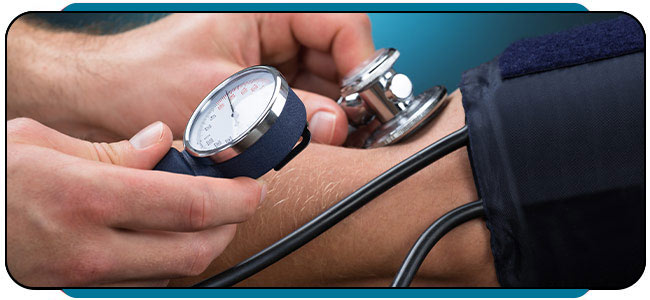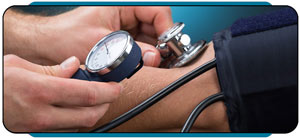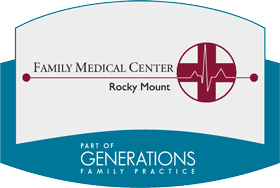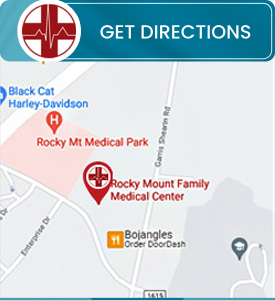Hypertension Treatment Clinic in Rocky Mount, NC
High blood pressure, often known as hypertension, is a frequent disorder in which blood pressure is elevated above normal. There are often no symptoms, but if goes unnoticed it can lead to serious consequences. You should have your blood pressure checked to see whether you have high blood pressure. Hypertension, according to the National Centre for Health Statistics, raises the chances of heart disease and stroke, which are two of the most significant causes of mortality in the United States. At Rocky Mount Family Medical, our team offers the latest diagnostic and therapeutic advancements for high blood pressure treatment. For more information, please contact us or book an appointment online. We are conveniently located at 804 English Rd, Suite 100 Rocky Mount, NC 27804.


Table of Contents:
What are the symptoms of hypertension?
What is the main cause of hypertension?
What are the stages of hypertension?
How do you feel when your blood pressure is high?
High blood pressure, known as hypertension, develops when the force of blood traveling through your arteries is persistently elevated. This elevation in blood pressure arises from the narrowing of blood vessels, creating heightened resistance to the flow of blood.
Consequently, the narrower these arteries become, the greater the resistance, leading to an elevation in blood pressure levels. Over time, this heightened pressure can give rise to various health complications, particularly heart disease. The onset of hypertension typically occurs gradually over several years, often devoid of noticeable symptoms.
Despite the absence of symptoms, elevated blood pressure can inflict damage upon blood vessels and vital organs, with the brain, heart, eyes, and kidneys being particularly susceptible. The progression of the condition may span years or even decades before it reaches a severity that manifests observable symptoms. Moreover, these symptoms might mistakenly be attributed to other underlying issues.
Severe hypertension may display symptoms such as flushing of the skin, the presence of blood spots in the eyes, and episodes of dizziness.
At our primary clinic, our team finds it important to note that these symptoms may not be universally present and can vary from person to person. Due to its often symptomatic nature, the most effective approach to detect the presence of hypertension is through regular blood pressure measurements.
Our medical practitioners typically monitor blood pressure readings during routine appointments, offering insight into a person’s blood pressure levels over time. For individuals undergoing annual physical examinations, it is advisable to discuss with your healthcare provider the potential risks associated with hypertension and the necessity for additional measurements to ensure diligent monitoring of blood pressure.
The primary cause of hypertension is often attributed to a combination of genetic predisposition and lifestyle factors. Genetics can play a significant role in determining an individual’s susceptibility to hypertension. If there is a family history of high blood pressure, the risk of developing the condition may be heightened.
Lifestyle choices also contribute substantially to the development of hypertension. Dietary choices, including excessive consumption of sodium, can contribute to elevated blood pressure by causing blood vessels to constrict and retain fluid. A sedentary lifestyle devoid of regular physical activity can lead to weight gain and obesity, which are associated with an increased risk of hypertension.
Additionally, excessive consumption of alcohol and tobacco use can contribute to elevated blood pressure levels. Stress and chronic stressors also play a role in hypertension, as ongoing stress can lead to elevated blood pressure over time.
The stages of hypertension include normal blood pressure, elevated blood pressure, stage 1 hypertension, and stage 2 hypertension. Normal blood pressure falls within a healthy range, indicating that the heart is functioning efficiently and pumping blood without excessive strain on the arteries.
Elevated blood pressure, however, suggests a heightened risk of developing hypertension in the future and prompts the need for proactive lifestyle changes. Stage 1 hypertension signifies an increase in blood pressure that requires attention and management to prevent complications.
Stage 2 hypertension reflects a more severe elevation in blood pressure, warranting immediate medical attention and intervention to minimize the risk of cardiovascular events.
You may not feel any different when your blood pressure is high, however, some individuals may experience sensations like a throbbing sensation in the chest or head, accompanied by feelings of lightheadedness or dizziness.
While these symptoms can occasionally manifest, it’s important to recognize that their presence might indicate more severe hypertension or underlying health issues. As a result, seeking prompt medical attention is crucial to ensure appropriate care and management, as such symptoms may point to potential complications associated with elevated blood pressure levels.
Hypertension treatment is available at Rocky Mount Family Medical. For more information, please contact us or book an appointment online. We are conveniently located at 804 English Rd, Suite 100 Rocky Mount, NC 27804. We serve patients from Rocky Mount NC, Nashville NC, Westry NC, Dortches NC, Red Oak NC, and Sharpsburg NC.

Additional Services You May Need
▸ Ancillary Services
▸ Diabetes Management
▸ Pediatric Care
▸ Family Care
▸ Men’s Health Care
▸ Women’s Health Care
▸ Employer Services
▸ Joint Injections (Cortisone)
▸ Laboratory Services
▸ Hypertension Treatment
▸ Vaccines and Immunizations
▸ Sports Physical Exam
▸ Flu Shots
▸ Dehydration Treatment
▸ Sunburn Treatment
▸ STD Testing



